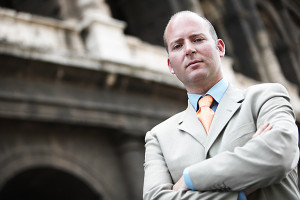 The most successful people in the world—in business, in family, in life, in sports, in entertainment—are masters of controlling their own states. That is, they are able to control their physiology so that they can be at their best at times when they need to be.
The most successful people in the world—in business, in family, in life, in sports, in entertainment—are masters of controlling their own states. That is, they are able to control their physiology so that they can be at their best at times when they need to be.
This is a crucial issue when it comes to prospecting in your career–because too often we don’t do the things we know we should because we don’t feel like it at the time. We “wait” for inspiration, energy, or the confidence to build itself. When you do this, are you in control of your state, or is your state in control of you?
If we gain the upper hand by putting ourselves in controlling your state, then there are two things you must learn to master:
1. your mind
2. your body
No big deal, right? In fact, there isn’t much else to consider, is there? As we indicated before, your state is the result of whatever messages you send yourself, combined with the physical condition of your body.
You may ask, “What about our environment? Doesn’t that influence our state?”
Sure. However, the environment is perceived through the mind. The same environment that favors a positive state for one person may favor a negative state for another. Take a crowded, networking event for example. One person in this environment may go into a positive, excited, fun and happy state—fed from the many people about meeting and greeting and talking about their business.
Another person may, in the same environment, go into a state of anxiety, quite possibly because he or she does not do well in such as situation. It’s all about how one perceives their environment.
Don’t think you can control your state? Think again. You do it all the time—or at least you attempt to.
Ever come home from a long day working, and after completing things around the house or with the family, just want to kick back and watch TV or read a book? You basically want to unwind, deflate. Whatever you call it, you are attempting to change your state.
Indeed, changing our state is what we are trying to do all the time. Most compulsive behaviors (substance abuse, overeating, excessive television, etc.) are attempts to change states. So are positive activities such as reading, meditation, prayer and exercise. Pharmaceutical companies promise cures for undesired chronic states, such as anxiety and depression, by treating physiological conditions that are believed to be tied to them.
However, in most cases, physiology is only part of the solution. The messages you send to your brain—your “self-talk”—often plays an even greater role in your state and thus your resourcefulness. The mind is more powerful than the body. Anyone who has mastered their state will attest to this.
Give this some serious consideration. Think of times when you are at your very best–at your peak performance. What was your state then? What were your inner thoughts? What was your environment like? In an upcoming piece we will go a bit further into steps you can take to put you back in control of your state, rather it being in control of you.


Be the first to comment on "Are You in Control of Your State, or…"